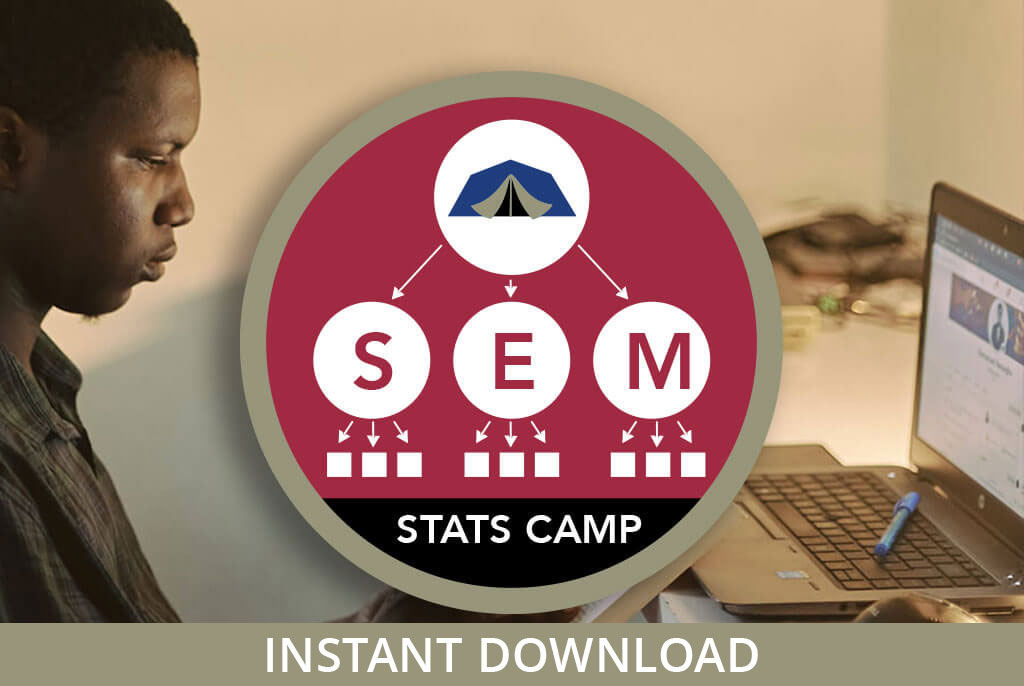Instant Asynchronous Video Download – 4-day Statistics Short Course
Seminar Overview: SEM Foundations & Extended Applications
Do you want to take your measurement to the latent level? Well, this is it, you have found it, the foundation to what you need to know for latent variable modeling – structural equation modeling (SEM)! Most campers report their prior training was insufficient and/or outdated. We will introduce you to the current techniques and advances in SEM as well as guide you through the steps to ‘craft’ an exquisite SEM model.
Seminar Topics:
- Phantom Constructs
- Fitting measurement models
- Three methods of scale setting – including effects coding!
- Updated recommendations for Scale Validation
- Multiple-Group Comparisons with applications for experimental and observational groups!
- Factorial/Measurement Invariance – Are you measuring the same construct?
- Extended Applications Such as Parceling and Missing Data
- Mediation and Indirect Effects using Bootstrapping
- Moderation, creating latent interaction terms!
Seminar Description:
This 4 day short course covering SEM Foundations & Extended Applications is an intensive short seminar on the principles of structural equation modeling.
Instructor: Todd D. Little, Ph.D.

Todd D. Little, Ph.D. is a Professor of Educational Psychology at Texas Tech University (TTU). Little is internationally recognized for his quantitative work on various aspects of applied SEM (e.g., indicator selection, parceling, modeling developmental processes) as well as his substantive developmental research (e.g., action-control processes and motivation, coping, and self-regulation). Prior to joining TTU, … Little has guided quantitative training and provided consultation to students, staff, and faculty at the Max Planck Institute for Human Development’s Center for Lifespan Studies (1991-1998), Yale University’s Department of Psychology (1998-2002), and researchers at KU (2002-2013, including as director of the RDA unit at the Lifespan Institute and as director of the Center for Research Methods and Data Analysis). In 2001, Little was elected to membership in the Society for Multivariate Experimental Psychology, a restricted-membership society of quantitative specialists in the behavioral and social sciences.
In 2009, he was elected President of APA’s Division 5 (Evaluation, Measurement, and Statistics). He founded, organizes, and teaches in the internationally renowned ‘Stats Camps’ each June (see statscamp.org for details of the summer training programs) and has given over 150 workshops and talks on methodology topics around the world. As an interdisciplinary-oriented collaborator, Little has published with over 280 persons from around the world in over 65 different peer-reviewed journals. His work has garnered over 11,000 citations. He published Longitudinal Structural Equation Modeling in 2013 and he has edited five books related to methodology, including the Oxford Handbook of Quantitative Methods and the Guildford Handbook of Developmental Research Methods (with Brett Laursen and Noel Card). Little has served on numerous grant review panels for federal agencies such as NSF, NIH, and IES, and private foundations such as the Jacobs Foundation. He has been the principal investigator or co-principal investigator on over 15 grants and contracts and he has served as a statistical consultant on over 70 grants and contracts. In the conduct of his collaborative research, he has participated in the development of over 12 different measurement tools, including the CAMI, the Multi-CAM, the BALES, the BISC, the I FEEL, and the form/function decomposition of aggression.
Instructor: Zachary Stickley, Ph.D.
Zachary, Ph.D. is a senior research scientist at Yhat Enterprises LLC. where he pursues his research interests in measurement design, applied latent variable modeling, and modern approaches to missing data. Dr. Stickley has also served as an instructor and coordinator for the Stats Camp Foundation since first joining the team as a graduate student in 2018. He received his Ph.D. in Educational Psychology from College of Education at Texas Tech University with a focus on research methodology, measurement design, and statistical modeling. He received his Master of Education degree from Texas Tech University and his Bachelor of Science in Psychology from Tarleton State University.
APA Continuing Education Credits:
This course is NOT eligible for CE credits. You must attend a livestream or in-person event to qualify.
Seminar Includes:
Materials, downloads, recorded course video viewable for up to one year.




